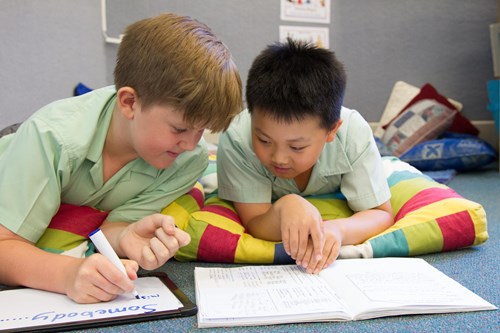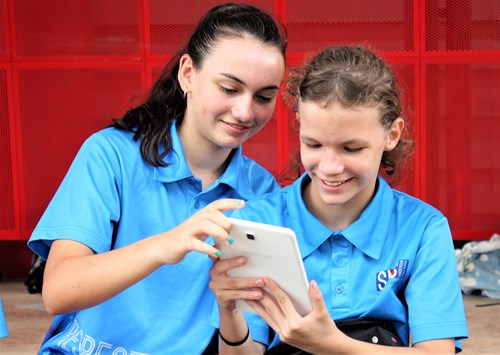Introduction
Dear colleagues,
This is the final report for 2017 and I would like to take the opportunity to wish everyone a safe, relaxing and restorative festive season.
Dr Fiona Mueller left her position as Director, Curriculum in November and I am sure I speak on behalf of staff and stakeholders in acknowledging what an impact she made on improving the learning of all young Australians in her time at ACARA. Her unwavering dedication to students at the centre of Curriculum’s work was inspirational for those who worked with her in the office and those in our many stakeholder groups.
The Curriculum unit at ACARA continues to support stakeholders in their implementation of the Australian Curriculum on request, while undertaking a program of research to inform future refinement of the curriculum. In October the unit hosted the annual meeting of Australian Alliance of Associations in Education (AAAE) at the ACARA Sydney office. This was an opportunity for representatives from a range of professional associations to provide input into some key questions about the purpose of curriculum and what students should learn.
ACARA’s Curriculum Directors’ meeting, hosted by the Department of Education in Hobart in late October, was complemented by a workshop on the Australian Curriculum Achievement Standards. The Curriculum Directors also explored those same key questions which will guide refinement of the Australian Curriculum.
A range of other curriculum activities are described in the reports below.
ACARA’s Aboriginal and Torres Strait Islander Education Taskforce and Advisory Group have been guiding the development of content elaborations for the Australian Curriculum: Science. Aboriginal science educator Joe Sambono from DET in Queensland has been working with the Curriculum Specialists in Science and in Aboriginal and Torres Strait Islander Education to write elaborations that are specific to the Aboriginal and Torres Strait Islander Histories and Cultures cross-curriculum priority. Consultation with key stakeholders and Aboriginal and Torres Strait Islander communities will occur over the course of 2018 before the elaborations and teacher background information are published.
The Australian Curriculum’s General Capabilities attract considerable interest from international visitors to the website as well as individuals and groups who collaborate with ACARA’s Curriculum Specialists. Recent workshops have focused on Personal and Social Capability and Critical and Creative Thinking. An explanatory video about the General Capabilities is now available on the Australian Curriculum website.
To access this video, please go to the link below:
www.australiancurriculum.edu.au/f-10-curriculum/general-capabilities/
ACARA’s Curriculum Specialists for General Capabilities (Danielle Cavanagh) and Student Diversity (Robyn Copland) work with states and territories, on request, to support the use of the three-dimensional Australian Curriculum, and they welcome approaches from school authorities and other stakeholders. Where possible, this support should be made available to participants across sectors. For further information, please contact Danielle or Robyn using the contact list on the last pages of this report.
The 2016-2017 report is in draft for the consideration of the ACARA Board. It is due to be published in early 2018. Of interest will be the responses to the focus on student diversity and how the Australian Curriculum is used to meet learners’ needs; and the extent to which the Cross-Curriculum Priorities are being implemented.
Following consultation with states and territories and national stakeholder groups, ACARA received recommendations for improvements to Version 1.1 of the National Literacy and Numeracy Progressions. These included changes to aspects of the structure of the progressions, expanding the progressions to ensure they were inclusive of all learners, improving the diagrams and minimising the use of technical terminology. Version 2.0 was approved by the ACARA Board on 19 October and will be submitted to Education Council in December for approval. It is anticipated that the progressions will be available as an online resource to support the Australian Curriculum in January 2018. The curriculum specialists for Mathematics (Margaret Bigelow) and English (Kim Reid) can be contacted for further information about the National Literacy and Numeracy Progressions.
ACARA’s curriculum work is assisted by the Students with Disability Advisory Group (SWDAG) with their final meeting being held on 5 December. The meeting will include shared examples of practice from members and the SWDAG research sub-group will be presenting their work on criteria for effective research.
Four new illustrations of practice (IoP) will be published on the Australian Curriculum website in the near future; these focus on differentiating the Australian Curriculums using the three-dimensional design to plan teaching and learning programs for students with disability. Whilst the IoPs are set in Special schools, the content can be applied across school settings, demonstrating explicit examples of curriculum differentiation.
In October ACARA’s Curriculum Specialists for Student Diversity (Robyn Copland) and General Capabilities (Danielle Cavanagh) presented at workshops for teachers attending the Queensland Curriculum and Assessment Conference ‘Navigating the Australian Curriculum and assessment for students with disabilities’. Curriculum Specialists work with states and territories on request, to support the use of the three-dimensional Australian Curriculum, and they welcome approaches from school authorities and, where possible, cross-sectoral agencies. For further information, please contact Danielle or Robyn using the contact list on the last page of this report.
Introductory workshops for the National Innovation and Science Agenda (NISA) school education project known as Digital Technologies in focus: Supporting implementation of Digital Technologies continue to be held around the country with the following locations included since our last report: Cairns, Lismore, Coffs Harbour, Ballarat, Shepparton, Newcastle, western Sydney, Armidale, Gunnedah, Parkes, Dubbo, Albury, Adelaide, Alice Springs and Darwin. There are now more than 150 schools working closely with ACARA Curriculum Officers to implement action research-type projects linked to the Digital Technologies curriculum. Professional learning and school visits are being planned for 2018.
ACARA hosted a discussion to explore how initial teacher education for the Technologies curricula can be updated and enhanced for primary and secondary education to reflect the intent of the Australian Curriculum: Technologies. Representatives from the following organisations were invited: Australian Councils of Deans from: Agriculture, Built Environment and Design, Education, Engineering, and Information and Communication Technology; the Australian Institute of Teaching and School Leadership (AITSL); the Australian Government Department of Education and national professional teaching associations. Recommendations and actions from this discussion will be shared with the ACARA Board and the STEM Partnerhips Forum.



